– Andrea Cavalletti
The Theatre of Sleepwalkers
Andrea Cavalletti (philosopher)
in conversation with Riccardo Giacconi
Bologna, November 2016
published on The Variational Status
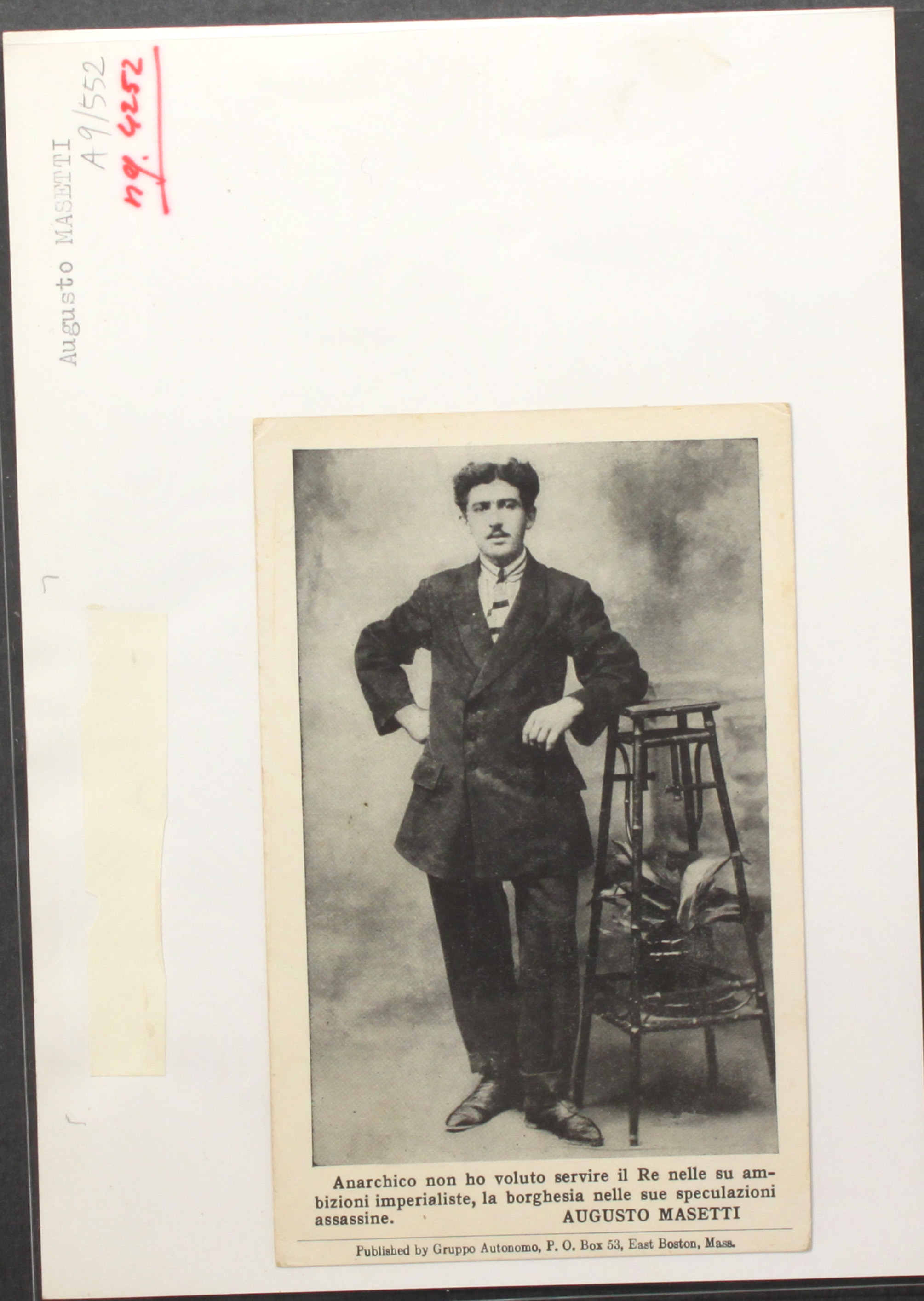
Picture postcard of Augusto Masetti. Published by Gruppo Autonomo, East Boston (MA).
On the morning of 30 October 1911, while in the courtyard of the Cialdini barracks in Bologna, waiting to leave for the war in Libya, the soldier Augusto Masetti shot his rifle at Lieutenant Colonel Stroppa, wounding him in the shoulder. On being interrogated, Masetti would say he had no recollection of the incident, and that for this reason he could not repent. I would like to start off by talking about your book, Suggestione (Bollati Boringhieri, Turin 2011), and in particular about this episode, linked to the themes of the book, yet which you actually decided to omit.
Actually, this was the age of amnesia, depersonalisations and suggestion. Around the turn of the 20th century, the cases of double personalities escalated, as well as women or men disappearing or, with no memories of themselves, starting a new life elsewhere. The episode of the anarchist Masetti is part of the panorama, and thus it has roots that go far back. Just as the word ‘suggestion’ itself at the time stood for that which at the end of the 18th century was called ‘mesmerism’ or ‘animal magnetism’, likewise in the loss and doubling of the personality, the old story of possession re-emerged. That said, rather than insisting on the issue of responsibility, I believe it to be more important to highlight the political component of suggestive possession, and its unforeseeableness.
It would appear that in Colombia, a case similar to that of Masetti may have given rise to a marionette figure, known as el espiritado. During a series of interviews that I carried out, many of the puppeteers of Bogotà told me that in order to be a good puppeteer, you have to let yourself go to the object that you’re bringing to life. This is a kind of two-way possession: it’s also the object that is animating you. It seems to be a similar idea to a passage found in your book when you write: “The voice of the character is undetermined in that of the magnetiser. Yet at the same time, even the influence of the magnetiser is lost in the genius of the magnetised. A perfect co-existence is created, an unsurpassable duplicity and a total indeterminacy.” I would like you to talk about this idea of a power which, while it acts, must also in some way let itself go. You define it as the paradigm of the uncertainty of power.
Yes, I also draw on the Hegelian theory of the ‘double genius’, according to which activity and passivity are indeterminate. But let us go one step at a time: the great psychiatrist Hippolyte Bernheim stated that everything is suggestion. Then Freud raised his objections: if suggestion is the explanation for everything, what is it that explains suggestion? This wry rhetorical question introduces the need for a new theory: that of psychoanalysis of course. Instead, my book attempts to take Bernheim’s motto seriously: everything really is suggestion, and it is so in the biopolitical/securitarian context that still governs us. The biopolitical model is in fact historically and logically evocative, and this is because ultimately is it not based on anything: or rather, it is based on an uncertainty or a constitutive indeterminacy.
Now, the interpretation of ‘animal magnetism’ that Hegel offers in a few dense pages of the Encyclopaedia of Philosophical Sciences (which Jean-Luc Nancy had already dealt with from a different point of view) highlights this aspect. What’s more, these pages are bound together by very close relationships (and by a perfect terminological correspondence) to those renowned ones on the dialectics between the servant and the master. Hence, Hegel illustrates the relationship between the magnetiser and the magnetised starting from the immediate, ‘magic’ link that would seem to bond the foetus, a purely passive being, to the mother, or rather to the maternal genius, capable of influencing the foetus by determining several of its dispositions – in terms of character, for example or also physical, somatic ones. Instead, in the case of the ‘malaise of the soul’ known as ‘animal magnetism’, this relationship with the tangible sphere is exercised by an external individual or genius: thus it is no longer an internal, immediate, magical relationship, but a genuine relationship of the subjectation or ‘power’ (Macht).
Nevertheless, it is exercised on the same sphere of sensitivity on which the first maternal influx made its impression, the sphere which now lies under the genius or character of the subject, i.e. all that which sediments after birth: habits, inclinations etc. In other words, with regard to the sensitivity of the magnetised, two influences, two geniuses remain: the magnetiser and the character. The influx is thus two-sided: external (that of the magnetiser) and not just external (that of the character), and it is by virtue of this very duplicity that it is impossible to determine whether an action has been induced, favoured, or ordered by one or the other. It’s impossible to establish whether a given behaviour is rooted in character or in external conditioning. The same goes for the magnetiser: despite everything, he will never know whether the sleepwalker obeys him or his own character, and he can never really know whether the subject is carrying out an order or seconding an inclination of his own genius.
There is an insuperable uncertainty or indeterminacy in suggestive power relationships. And it’s for this reason that, in the book, where I do not speak directly about Masetti but about Mario, the figure in the story by Thomas Mann Mario and the Magician who kills Cipolla, the hypnotist and magician (the alter ego of Mussolini), I proposed substituting the paradigm of the resistant animated by self-awareness and free will. To counter the classical reading by Hans Mayer, based on the concepts of free will and resistance, I set out to present an interpretation based on indeterminacy and the ambiguity of the suggestion game. In actual fact, the opposition between will/suggestion is not to be taken for granted. While will cannot generate suggestion, as one of Bernheim’s epigones said, suggestion generates will. Which also goes for resistance: this is aroused, provoked by the suggester, who must first of all understand what orders the subject will not carry out and to which, on the other hand, he will be sensitive: while not everyone will do everything, everyone will do something. And so, in order to explain Mario’s (or Masetti’s) gesture, I tried to illuminate that which is completely outside the magician’s control. By animating desires, provoking resistances, he believes he can control the subjects, dominate them and manage an orderly, vertical, hierarchical relationship. In order to be strong, the magician has to believe in his strength and thus he does not recognise the duplicity of genius, nor does he contemplate the possibility that those who appear to carry out his orders are in actual fact following another voice, that nothing is so clean-cut, and that everything in the end is indeterminate and unforeseeable.
That which remains obscure to the suggesting magician instead appears perfectly clear to the puppeteers you mentioned: for them it’s a matter of letting themselves go, along with the voice of their own genius and that of the genius-puppeteer – or rather the character – to reach the state of indeterminacy in which puppet and puppeteer are one and the same thing.
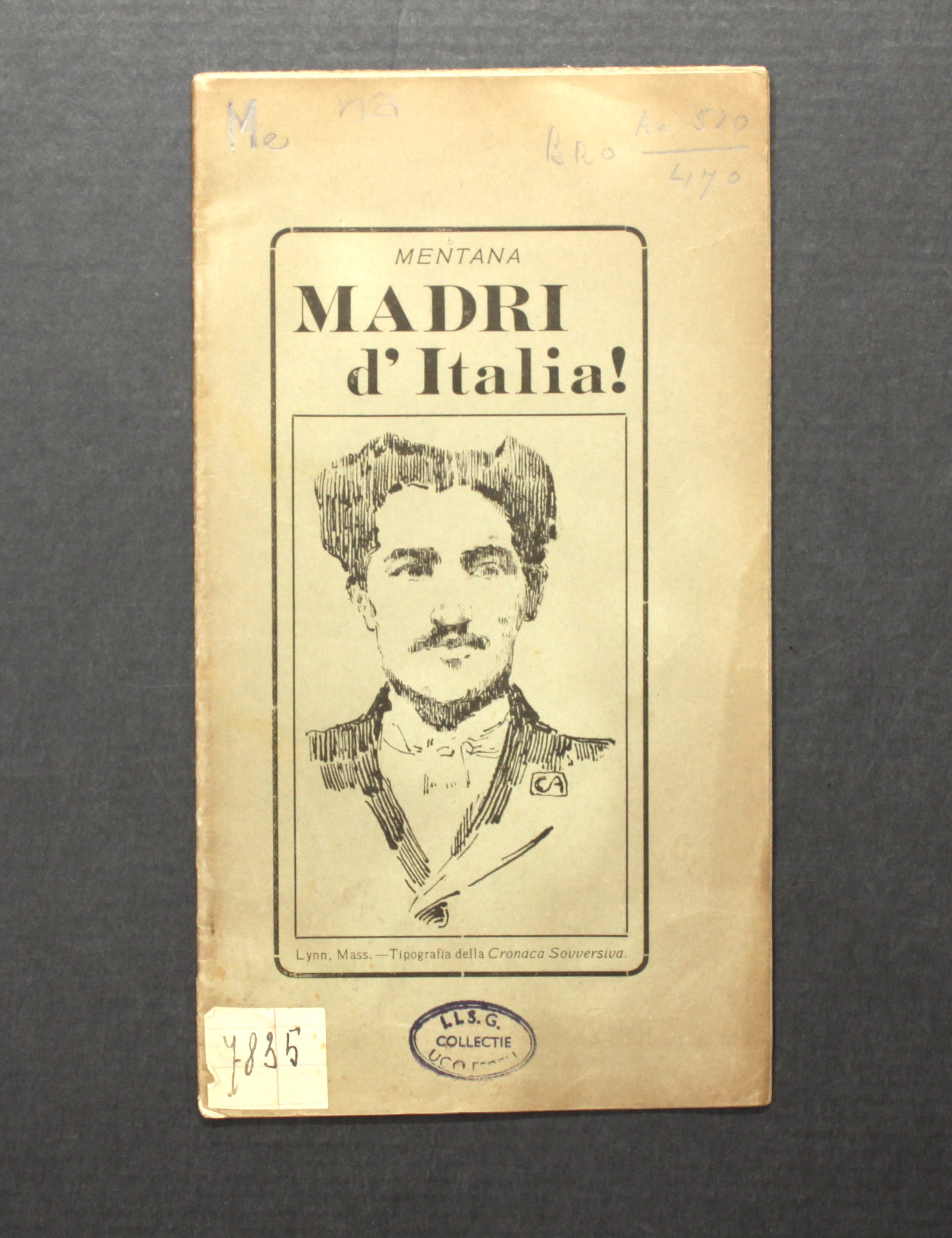
Mentana, Madri d’Italia! (Per Augusto Masetti), Cronaca Sovversiva, Lynn (MA) 1913.
In fact, in my conversations with puppeteers, the notion of ‘empty space’ often came up, of that space to be left free in order for the animation process to take place. I was reminded of the book of the same name by Peter Brook, published in 1968, which opens thus: “I can take any empty space and call it a bare stage. A man walks across this empty space whilst someone else is watching him, and this is all that is needed for an act of theatre to be engaged.”
Ultimately, it’s an empty space of consciousness, of will: it’s the moment in which the sphere of passivity, of the openness to influence and of indeterminacy emerges. Just as the puppeteer may himself be brought to life, it is for the same reason that Cipolla the magician fails: because we don’t know who is animating whom, nor do we expect to know it. The political magician – i.e. the dictator as the ‘great actor’, to cite the definition of Mussolini offered by Camillo Berneri – aims to establish a relationship of subordination and subjection and exercise a form of control about which the puppeteer is rightly unconcerned, instead keeping to the indeterminacy of the suggestive relationship and the duplicity of possession. We might say that the political magician really is, in every sense, a wicked puppeteer.
In Brook’s terms, as you rightly understand them, we might say instead that he who stands as a leader or ‘great actor’ vainly attempts to use his commands to fill what remains an ‘empty space’ for the real puppeteer. Of course, here we’re talking about a theory of inspiration (or indeed of genius), which however reveals – like all our aesthetic concepts – a decidedly political edge. The void in question is an absence of arché. Thus the possession of the masses by the leader is countered by the anarchic inspiration of your puppeteers, or of the two-sided, indeterminable geniuses. That’s it, we need to become puppeteers, artists, to reach and nourish the duplicity or ambiguity of the genius, the perfect inseparability of subjectivation and subjection, in order not to subject and not simply be subjected ourselves.
How did the idea come about of writing a book on suggestion? It seems to me that, in the political analysis, you’re hinting at a lack of reflection on the concept of will, which is not something given but which is constructed.
I might pick up on the idea of will as construction – and as a product of suggestion – from the great French psychologists of the 19th Century: I cite it to contest the theory of Mayer (and implicitly all the theories on will as the first, underivable element on which there was and still is the belief of being able to construct a form of ethics and politics).
Now, the character of Cipolla the magician in Mario and the Magician, clearly inspired by Mussolini, is also modelled on the famous Cesare Gabrielli, the hypnotist who performed in Italian theatres in that period, and who is also portrayed in The Children are Watching Us by De Sica (the film came out in 1943, and Gabrielli is shown here as a tired figure, in decline, just like the Fascist dictatorship). By the end of the 19th century, however, hypnotisers had put together a canon to be deployed not only in their shows but also in the scientific study of the phenomena of sleepwalking, animal magnetism and hysteria. Charcot, for example, in his theatre-cum-lecture hall at the Salpêtrière, as Joseph Delboeuf noted, put together outright spectacles in which imitation played a key role, and – as his critics would point out – did nothing but copy the model of sideshow hypnotists, with a few variations here and there. And so Mann, in his story, thumbs through the vast catalogue of suggestive techniques offered by figures such as the famous Donato (the genuine founder, of whom Gabrielli was a worthy descendent) and by others, who instead practised their arts in the most prestigious of clinics. In particular, Cipolla uses the alternation of the persuasive invitation and the imperious command, which was a technique developed by Bernheim himself. And as a matter of fact, Mann must have known his theories: if not directly, at least through the essays by Freud (who had in fact been a translator of Bernheim’s works), first and foremost through Group Psychology and the Analysis of the Ego (1921).
The importance of Bernheim, at any rate, is fundamental in all respects. One of the most interesting and contemporary aspects of his theory is the idea that suggestion is not carried out in a precisely vertical manner, but as it were, circular, with a return effect or conditioning, meaning that the suggester issues orders while undergoing the effects of those orders himself. In other words, I command, I can command if I react suitably to the responses of the suggestee. That is, the real order is triggered by the reaction to the order; it’s a suggestion which, depending on how it is perceived and on the effect of the return, triggers a certain power game, a game which the suggester may dominate in the measure to which he shows himself to be happily sensitive to the answers. In other words, the commander is the one who is convinced he is commanding. Thus there is no vertical position of power given once and for all; rather, there is a complex relationship, one in which the position of command must be built time after time (just as the will is constructed). The suggester must therefore remain in a state of grace, and it is charismatic power itself that always requires feedback.
We might say that political power works on the basis of this circularity, in which the enchanter is happily the victim of his own charm, in which every suggestion is an autosuggestion, and we might thus explain the role of opinion polls, methods of checking which may help but may also betray, for they are at any rate cumbersome and cannot substitute pure sensitivity and the unconditioned response. This game, which as I said before always remains indeterminable and uncertain, is shown by Mann “under a magnifying glass and in slow motion” (Lukács), rendering it in its micrological dimension.
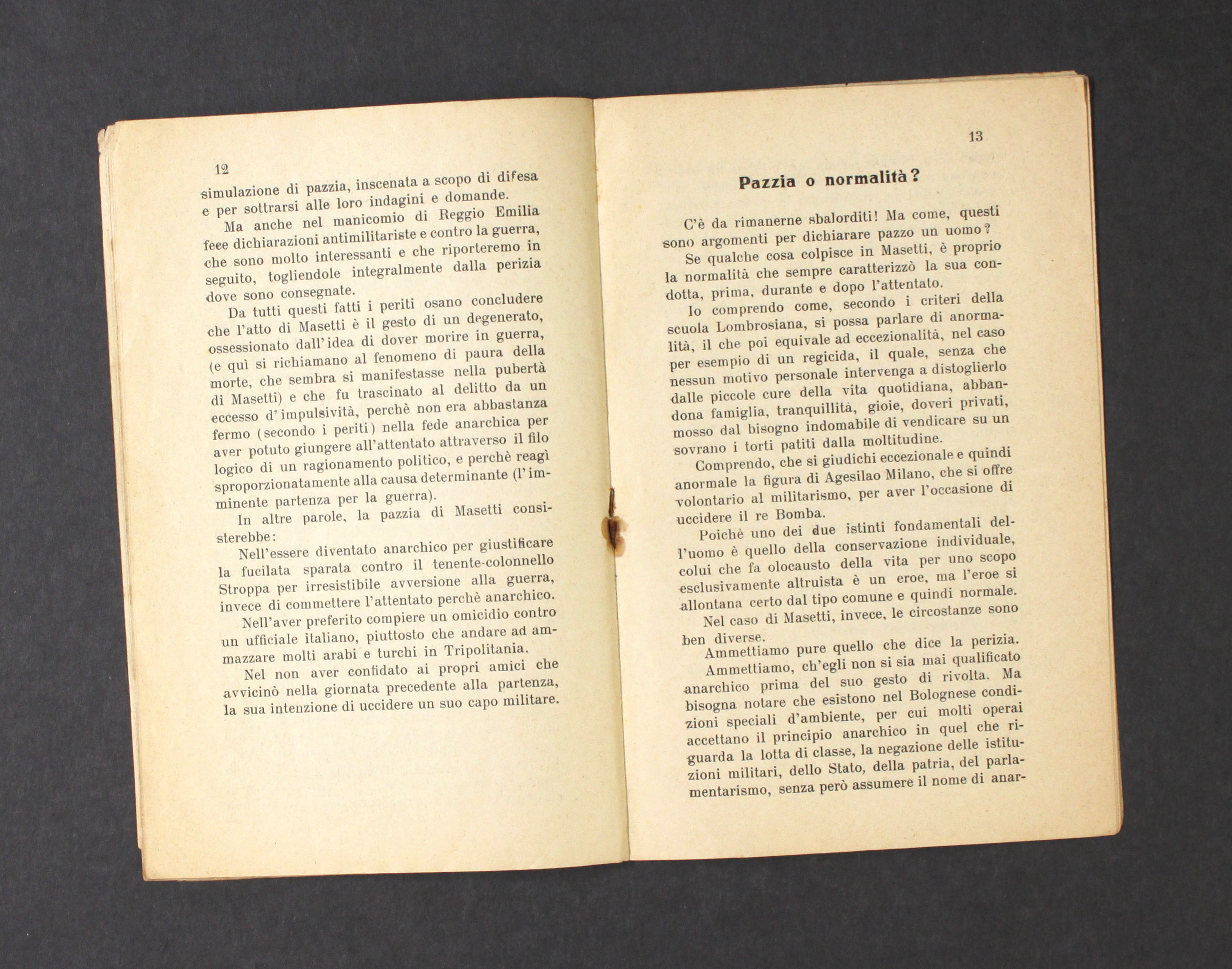
Erre, Augusto Masetti non è stato mai pazzo. (Considerazioni sulla perizia Petrazzani), Tipografia Camerale, Parma 1914.
In that case, it is also a matter of how power acts on an individual level, how the magician Cipolla acts on a specific person.
Exactly. This is the great issue of the relationship between the individual and the collectivity. The young Fromm, for example, pointed out that in Freud (i.e. in Group Psychology and the Analysis of the Ego) this relationship is a pure and simple analogy, i.e. it remains unresolved. In 1884, to give another example, Gabriel Tarde, the master of sociology, the first real theorist of imitation and fashion, defined life in society as a state of sleepwalking (“To have only received ideas while believing them to be spontaneous: this is the illusion to which both sleepwalkers and social man are prey”), stating that in order to explain the phenomena of general imitation, the sociologist must make way for the psychologist, i.e. examine the specific case of the relationship between the therapist and the patient. Tarde was thus able to cite the contemporary theorists of suggestion (“Bernheim et al.”) because in his system, the passage from psychology to sociology, from the individual to the collectivity, is only possible on the basis of ‘universal sociomorphism’, i.e. the idea that everything is immediately social, that every being and every phenomenon is an association (an imitative one, according to Tarde) of beings and phenomena. But let us consider the Hegelian theory of the ‘two-fold genius’ from this point of view: not only does the indeterminacy of the influences confuse two geniuses, understood as two individuals, but every order and every response over the long series of collective influences. The command of the magnetiser is confused with other inclinations which come from the ‘second nature’, from education, from a personal history which is not exclusively personal. Hence there is no two-sided relationship which, be it by multiplying or by analogical transposition, becomes a mass relationship. In actual fact, the suggester is nothing but the spokesman of a much longer-standing power, of a suggestive game which coincides with its own tradition. Bernheim always spoke in terms of previous conditioning.
You write that the totalitarian state is “not only the most lethal, but also the most hypnotic and suggestive,” and that “authoritarian suggestion is the necessary outcome and the never-fading ghost of every state.”
The explanation of Bernheim’s words, according to which “everything is suggestion” comes from the history of biopolitics: biopower is suggestive. According to Foucault’s thesis, biopower takes care of and is responsible for the living conditions of the population, if it is the power to manage and look after people’s lives and do as it wishes with them, rejecting them through death, and totalitarianism is simply its paroxysmal development: it is the most protective power, the one which most takes care of individuals’ lives, which most aims to protect them and fortify them; on the other hand, it is also the most lethal power, exposing the population to the risk of death (for death may purify and strengthen the race). What I’m trying to add, as I mentioned before, is that the biopolitical/securitarian system is originally (historically and logically) a suggestive framework, and that totalitarianism (both logically and historically) therefore represents an extreme development of the same devices and techniques of suggestion: it is both the most intensely bio-thanatopolitical and suggestive system.
I cited the book by the philosopher and militant anarchist Camillo Berneri, Mussolini grande attore (1934), the first analysis of the ‘actorial’ performance of the leader. The leading figures of the political scene of the early 20th century in fact used radio shows, cinema and newsreels. After all, their scripts drew heavily on the mass psychologists of the late 19th Century: The Crowd: a Study of the Popular Mind byGustave Bon had become a paradoxically inspiring text, and the underlying concept of these analyses was that of ‘prestige’. According to Tarde, the leader is prestigious, and this is enough to make him a leader. It is no coincidence that Cipolla the magician is also an actor, a hypnotiser and a conjurer.
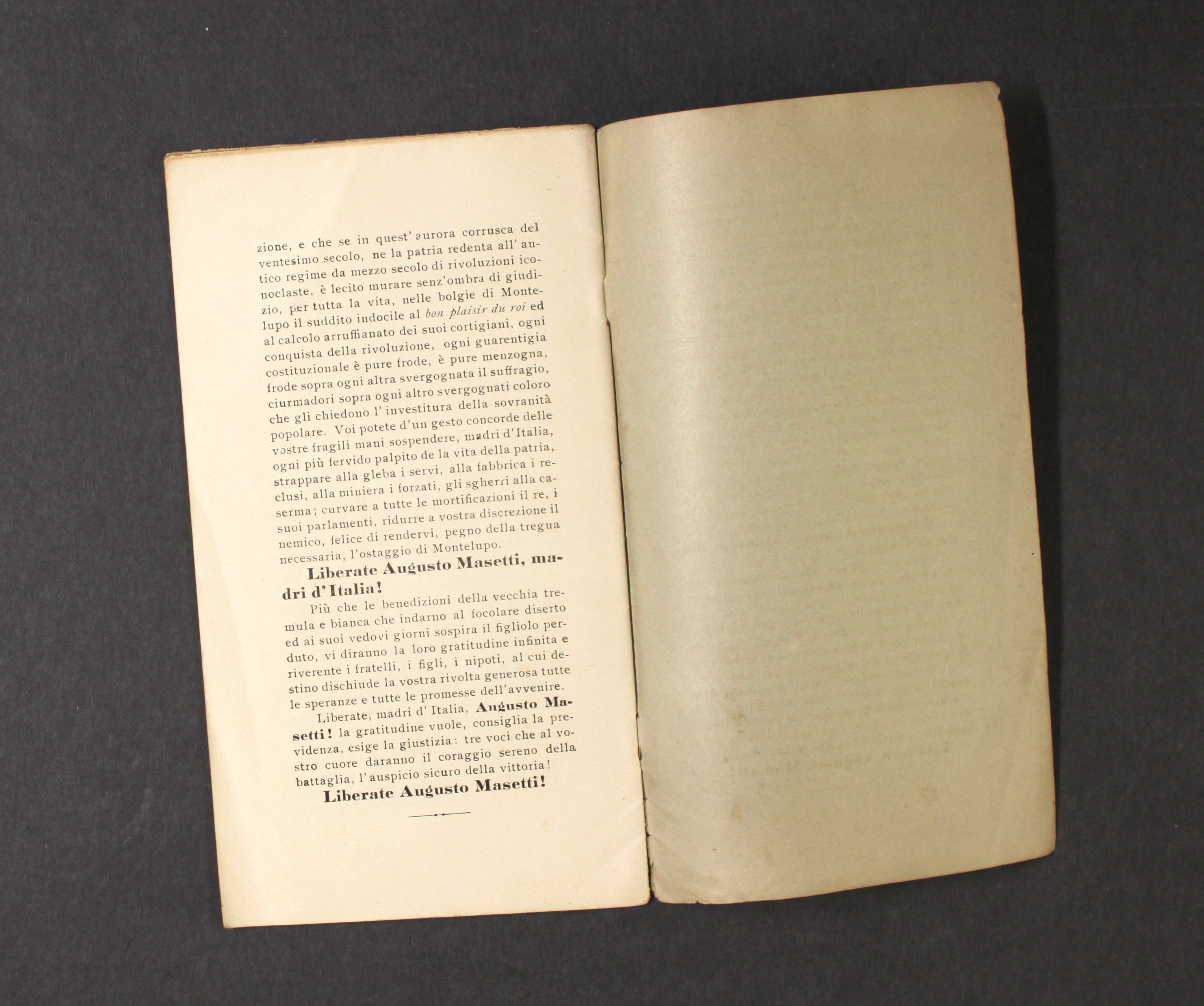
Erre, Mentana, Madri d’Italia! (Per Augusto Masetti), Cronaca Sovversiva, Lynn (MA) 1913.
Within this biopolitical horizon, what paradigm did the figure of Masetti represent? I have often examined his vicissitude through the notions of confession, alethurgia and parrhesia, analysed by Foucault in his last lecture cycles at the Collège de France. If the state deploys a system according to which a subject must ultimately be bound to his own actions, might we then look at Masetti’s presumed amnesia as an attempt to question the state-approved device of confession? In his case, a subject is declared separate from his actions by virtue of his being amnesic, ecstatic, out of mind. If at the same time the powers that be wish to reach a truth which links the subject to his own actions, the counterexample of Masetti offers an individual divorced from such actions.
In his last course at the Collège de France, in 1984, Foucault identified a number of examples of modern cynicism in the artist and in the political militant. The issue of the relationship between the nihilist that Foucault refers to and the figure of Masetti needs to be thoroughly investigated. On the other hand, suggestion is a definition of subjects. Just as Foucault said that there are no subjects but processes of subjectivation, we might say – pace Bernheim – that there are no subjects but just games of suggestion. These tend to determine, to establish the resistances and thus the weaknesses, the variables of character. The construction of the subject-patient is a sort of dressage, of training, of education. But its very nature is ungraspable and the whole construction may – like in Masetti’s case – give way suddenly. Military discipline, which as Jarry said is the final brutalisation in the hypnotic state, may thus give voice to the unforeseeable genius.
Let us go back to Bernheim and to his clinic in Nancy. Is everything really suggestion? Is there really nothing but suggestion? Yes and no. Delboeuf, whom I have already mentioned, shared Bernheim’s motto. Like Freud, he made a visit to Nancy and witnessed the remarkable success of suggestive therapy. But he had also recognised that just where everything is suggestion, that is where a non-suggestable subject may actually appear. Bernheim himself. Any way you try to place him under suggestion, says Delboeuf, he shows himself to be resistant: indeed, if the suggester attempted to make him concentrate on something (even then, certain hypnotists used a luminous dot or diadem), he would remain focused exclusively on the technique that the other person was trying to use. I would say that beyond the power dynamics (and death) that bind Cipolla and Mario, Stroppa and Masetti, a different level emerges, one we might define as being of pure technique. A non-suggestive, non-violent level, which Walter Benjamin called that of ‘pure means’. To contrast those spectacles propped up by forms of totalitarianism, Benjamin and Brecht actually called on the use of technique. The epic Brechtian theatre draws on a technique capable of destroying the effects of rapture, of fascination on which classical theatre is based. According to Brecht, like to Benjamin, cinema or classical theatre audiences are a mass in a state of hypnosis, following the leader or the actor in awe. Old theatre – said Brecht – is one of suggestion, while epic theatre is made using arguments.
At the end of the book, you also speak of the idea of tradition in Benjamin, i.e. of a life in which “there are no real masters or leaders, for everything is always education.” Is this just another paradigm to counter suggestive power?
Yes, ultimately it’s the same thing I was talking about before. Benjamin wanted to remove the suggestive figure of the master from education, or rather the hierarchy that separates the teacher from the student, proposing a form of teaching which is at the same time a form of learning (or a form of learning which is also teaching). Like in the book, I’m quoting a letter written in his youth to Gershom Scholem, but the coherence between the Benjamin of a more anarchic inspiration of the 1910s and ‘20s and the heterodox Marxist of the later years is very close. In his major 1921 essay, A Critique of Violence, the technique is classed in the sphere of the nonviolent ‘pure means’ (which of course does not mean neutral. While by virtue of its presumed neutrality, the technique irremediably ends up in the hands of the strongest, instead for Benjamin it is a matter of isolating the technique from the Gewalt, from power, from violence, from the force of authority). The theme of technique is then taken up again and elaborated from the middle of the ‘30s in the famous essay dedicated to The Work of Art in the Age of Mechanical Reproduction and in those, of course, on Brecht’s theatre. In a very important note to the essay on reproducibility, Benjamin deals with the theme of the suggested mass, of Le Bon, of crowd psychology and of the revolutionary class. The crowd, the raw material of forms of fascism, which is always compressed in a state of both tension and panic, scared and dangerous, with a taste for the thrill of war and willing to partake in racist follies, is countered by an absolutely original notion of class. Indeed, class is not conceived in terms of a mass labour base (factory workers or farmers), but by a destructive moment, one of the dissolution or loosening of the crowd, of the tensions running through it, i.e. as the loosening and distension (Auflockerung) of the hypnotised mass.
Now, epic theatre is also a technique of distension, of Auflockerung. Just when the audience would tend to follow the story, spellbound, Brecht interrupts it sharply, only to make way for an analysis of the facts. Thus various possibilities are studied: why something happened, what didn’t happen, how and why everything could have gone otherwise... In other words, the story shows the spectrum of possibilities; it is loosened, just as the ballet instructor – says Benjamin – loosens the joints of the ballerina to make her carry out unexpected steps. And so together with the story, the audience also relaxes, loosens up, i.e. becomes a collaborator, no longer following the show in a state of passivity or almost hypnotic tension: it observes events with detachment and analyses them critically. The ‘fourth wall’ is thus also done away with, the immaterial wall which physically separates the spectators from the stage, doing away with all boundaries between the dramaturge, the actor and the audience. The revolutionary, as Benjamin in fact said, does not rise up above the masses like a star, but instead is capable of letting himself be continually reabsorbed by them. His is an anti-suggestive performance, based on technique, and the fitting political orientation for him lies in the right technical orientation. In other words, where the fourth wall falls, it is also easy for us to recognise a different declination of the themes of that letter to Scholem on education.
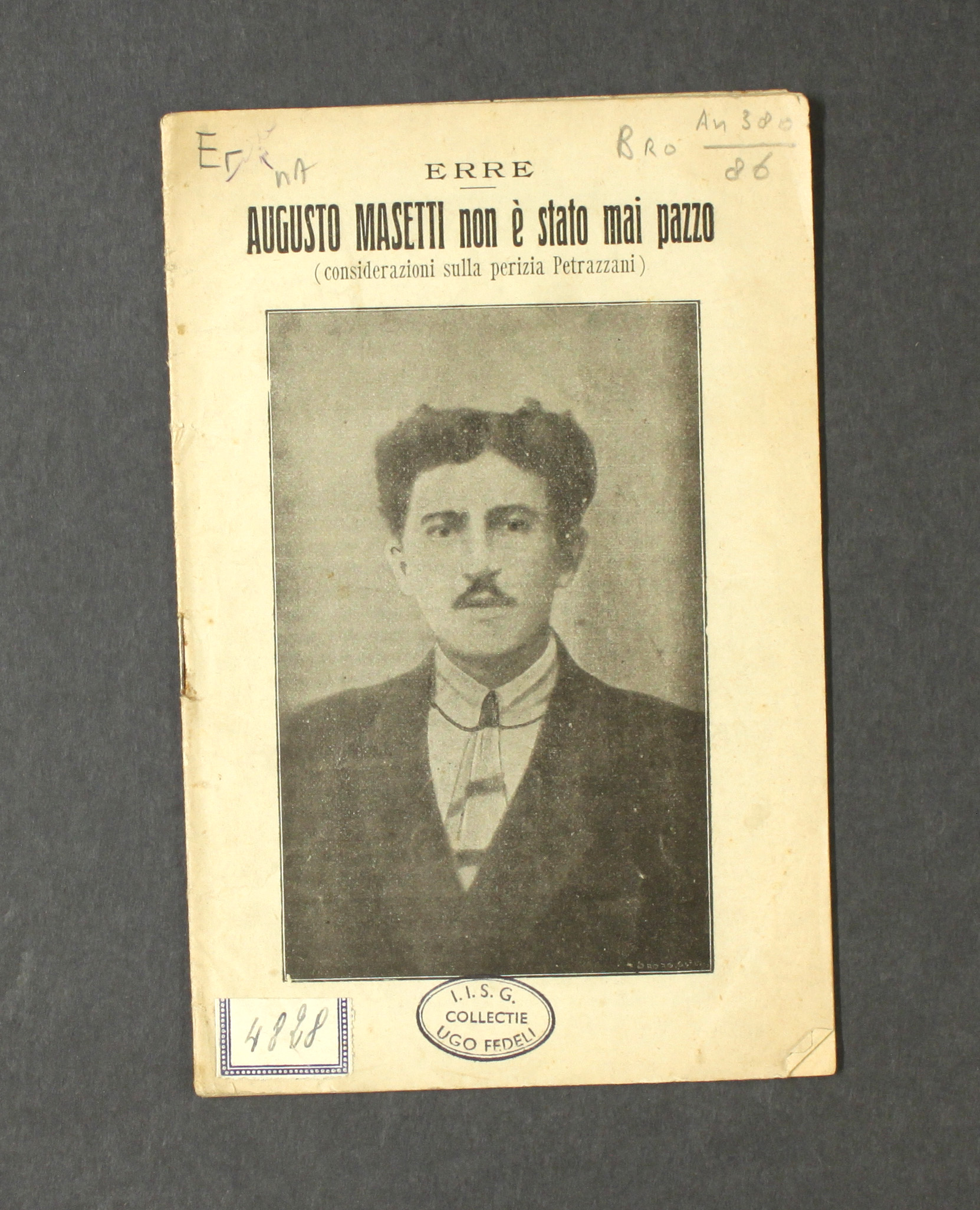
Erre, Augusto Masetti non è stato mai pazzo. (Considerazioni sulla perizia Petrazzani), Tipografia Camerale, Parma 1914.
Many puppeteers in Colombia told me that they are interested in Masetti’s amnesia: on one hand because it is in some way a paradigm of the practices of the puppeteer; on the other because it may be seen as a ‘perfect act of anarchy’. Amnesia attempts to dismantle responsibility, i.e. those mechanisms that the state deploys to bind an individual to his actions. In a short 1964 film in which he is interviewed by Sergio Zavoli, Masetti continues to claim that he can only draw a blank over a period of thirty-six hours, and asks: “How can one repent something he has no memory of?”
Masetti has lost the compos sui, the mastery of himself. On the other hand, he finds himself in an army barrack, being subjected to military discipline. An action of his own, in that context, would be unlikely: thus in his place there may be nothing but a gap. Masetti’s statement is a very fitting and intelligent one, which turns the tables of possession against the very military power which takes control of the lives of others. Furthermore, it also turns around the issue of responsibility or irresponsibility of those subjected to that power, transforming and undermining the sentence “I’m not responsible, I’m just following orders” (making us think here of Eichmann of course with his “it’s not me who is not obeying”). In short: seeing as you once wanted to subject me, don’t come asking for explanations now. The issue of responsibility and action leaves room for the theme of the unforeseeableness or duplicity which makes them both unassignable.
Masetti was then interned and declared mad by the state which, so as not to turn him into a hero, could not execute him. The judiciary mechanism thus gives way before the psychiatric one; his gesture is transformed from a political act to a ‘degenerate’ one, or – to use a term typical of Foucault, ‘abnormal’. You write that the biopolitical government, as a machine of mass suggestion, “captures the population by drawing a line between the healthy and the unhealthy, the normal and the abnormal.”
Yes, and it does so in the name of the categories of consciousness, will and self-control. Instead it would be only fitting to show that consciousness, will and self-control are in actual fact nothing but products of a game of suggestion.